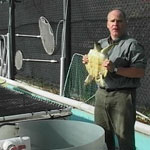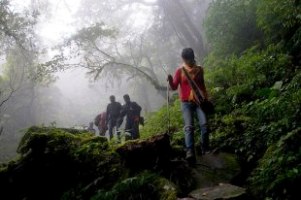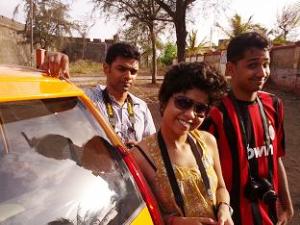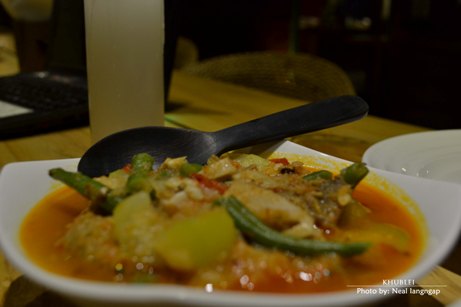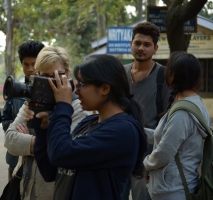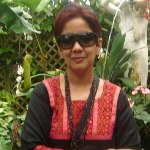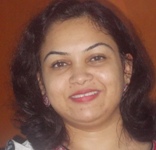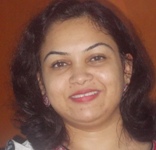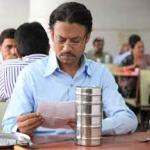Walk along the sidewalks of Sunnyvale's Bay area at San Francisco on early Sunday mornings, and you will find a lone woman in her 70s, on her routine stroll.
The lone, frail saree clad figure walking past with an umbrella is Sophiya Hazarika on her neighbourhood socialising routine. Age has given her a slight stoop. Her salt and pepper hair is neatly tied into a bun. A pleasant bespectacled face with wrinkles and wise... ready to burst into the most alluring of smiles and happy to call on her friends. Hidden in her graceful heart, is a painful story of nations that get created and divided to suit the whims of a few. Sophiya is into her 70s and hailing from the upper Assam town of Dibrugarh.
I still remember a story from my English book in school that touched me profoundly.
A little boy living in a border town near the Alsace - Lorraine region of France realizes a little too late, that he has no time left to learn his beloved mother tongue, French. His town would very soon be annexed by Germany as part of the post- war agreement.
That day was his last day in school. His French teacher tells the class that they will have no more French classes from the next day as his German counterpart would take over. His remorse at having neglected his mother tongue was intense. History is replete with such instances where homes, families and friends get torn apart by the mere stroke of a pen.
The sheer pain of being separated from one's motherland, from near and dear! My chance meeting with the remarkable woman Sophiya in 2004 summer showed just how distance makes one's love for homeland grow deeper over time. During our stay at Sunnyvale, `aunty' as neighbours and friends call her fondly, was a regular visitor at my sister-in-law's home. Be it a birthday party, a barbeque, a baby shower or a graduation ceremony, she would attend any Assamese get- together attired usually in a Mekhela-Chador (a traditional Assamese attire).
She is a loved and respected senior. Only after a few meetings with her did I begin to ponder over her life's inimitable twists. What was obvious all through our conversations, was her love for her birth place -- Assam.
Her mother passed away three months after she was born, in Dibrugarh. She was raised by her maternal grandmother in Nagaon, and got married early. Her husband, Abdul Qayum Hazarika from Nagaon was a Captain in the British army when they got married. After marriage, he got posted at Calcutta. She stayed at Nagaon with his family. Soon, India got partitioned, followed by the Calcutta riots. The air was tense. Communal tension was at peak.
British army officers influenced Abdul Hazarika to opt for East Pakistan, for a better career. They said he would be discriminated against in the Indian army for being a Muslim. This decision of her husband continues to disturb her till today. She thinks leaving India was the biggest mistake in their lives. She was too young and away from her husband then, to have the chance to dissuade her husband from such a step. She says she did not realize partition and their decision go to East Pakistan would have impact them for life, that she would not meet her family, and visit her dear Assam. Probably the physical proximity between Assam and East Pakistan was what they misjudged. They thought they could continue visiting family when they wanted to. That was not to be. To their dismay, relationship between the two nations only worsened with time. Their attempts to enter India even for a visit proved tough for many years.
Through her husband's army career, they were posted at Dhaka, Karachi and Rawalpindi. After Bangladesh got created, destiny took them further away from Assam. To Pakistan. He got posted at Karachi. Her son Asif was born in Karachi. After his Bachelor's in Engineering, he moved to US in 1979 to study Computer Engineering in the Oregon University. And decided to stay back.
After all their years in Pakistan, in 1988 they joined their son in the US. And eventually became American citizens. This was only when their repeated attempts for Indian citizenship failed. Memories of Assam haunted them in Pakistan too. But with complications in the Indo-Pak relationship, they were told getting an Indian citizenship would take a long time. Her husband's army background made things worse. Her husband's ill-health and his demise closed the citizenship chapter from her life. Her dream of eventually coming back to her homeland for good remained just a dream. Her eyes speak volumes of that pain to this day.
It's not like Sophiya had a tough life in Pakistan. She enjoyed her stay. It was a much more liberal society than it is now, she says. She took up a job in an American Insurance Company and also worked for Radio Pakistan. Her amiable nature got her many friends. She admits she was friendlier with the Bengali crowd in Karachi, probably due to the physical and cultural proximity of the two cultures - Assam and Bengal.
Musically inclined, she sang classical, Rabindra Sangeet and Nazrul Geeti that is named after the Bengali rebel poet Nazrul Islam. Because her Urdu was not fluent, she preferred to sing Bengali songs in Radio Pakistan. She joined the Nazrul Academy in Karachi where her husband was the Honorary Secretary. The Academy even awarded her in recognition of her long and dedicated service. She is thankful to the Mission School, Nagaon for her progressive outlook to life and people, in the little time she attended school. She is as comfortable celebrating Eid as participating in a Puja at a friends' home. Today's growing religious intolerance saddens her. She grew up in a land where religion did not divide human beings.
Sophiya has kept herself busy looking after her close-knit family consisting of her son Asif, daughter-in-law Durdana and her two grandsons Danial and Danish. The dedicated grandmother enjoys spending time with her grandchildren.
Sunnyvale and her childhood home Nagaon are poles apart. She enjoys the pleasant Mediterranean climate in her Bay area township and her close group of friends who have become family. Still, she misses the hills, the monsoons, the evergreen trees back home, trees that had the most delicious fruits- mangoes, jackfruits and coconuts which she shared with cousins in their huge garden by Kolong river. She cherishes beautiful childhood moments, growing up in a huge family with many cousins, uncles and aunts. She talks fondly of her aunts preparing delicacies during Id and Bihu.
Aunty enjoys cooking and reminisces that in 1963 she sent a recipe to Femina magazine from Pakistan. Her joy knew no bounds when it got published with her picture. She relishes Assamese dishes - Khar, Tenga, Pitika and simple Dail-Bhat. Her family finds Assamese food bland, leaving her with no company to enjoy it. Nostalgic about the pitha she had for breakfast in Nagaon, she says she invited friends over many times for Assamese meals in Pakistan. She continues to learn music in these senior years, at a classical music school.
Ask her how frequently she visited Assam and she beams. Her US citizenship means she gets to visit Assam as frequently as she likes even if she could not return permanently, says Sophiya. As a Pakistani citizen, even applying for an Indian visa took a long time because her husband was an army man. She sadly remembers how the first time she visited Assam after partition, was in 1976 -- to visit her ailing mother-in-law. Her husband could not visit when his mother passed away. No one from Assam was able to attend her son's marriage either, because of visa problems.
For her, visiting Assam is a feeling beyond words. Many relatives visit her when she is in Assam. She makes mandatory stops at Nagaon where her in-laws live and Dibrugarh where her late brother's family lives. Her visits help her catch up with family events. But age is fast catching up, and her Assam trips have become less frequent. And death of close family members who host her only makes her feel too dejected to visit.
She lost her most beloved uncle in Assam, Ataur Rahman, a parliamentarian, last year. His beautiful hillside home in a picturesque location overlooking the Brahmaputra river in Kharguli, Assam was her base during Assam trips.
Her yearning to return home for good continues in the meanwhile, and so do her Sunday morning meet-ups in Sunnyvale...









